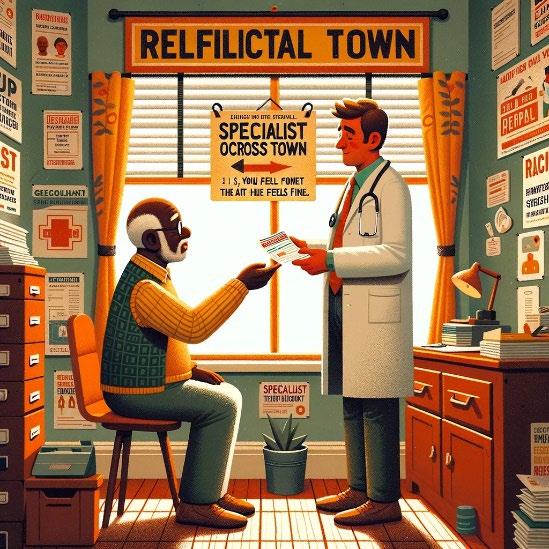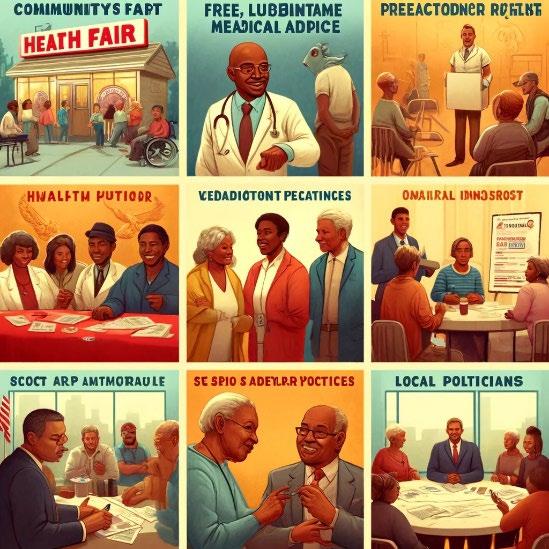

“Cash Cow” Syndrome




“Cash Cow” Syndrome:
The Exploitation of Low-Income Senior Citizens in Black Communities by Medical and Pharmaceutical Companies

The Target: Low-Income Senior Citizens in Black Communities
The healthcare landscape in the United States is fraught with inequities, and one of the most glaring is the exploitation of low-income senior citizens in Black communities by medical and pharmaceutical companies. This phenomenon, which can be described as the "Cash Cow" syndrome, highlights how these businesses profit massively from the very systems designed to provide essential healthcare services to vulnerable populations.
This blog delves into how these companies exploit Medicare and Medicaid benefits, the devastating impacts on the health of seniors, and the broader implications for social justice and public health.

The Demographics of Vulnerability
In many Black communities, low-income senior citizens are disproportionately reliant on Medicare and Medicaid for their healthcare needs. These government-funded programs are intended to ensure that the elderly and economically disadvantaged receive necessary medical care. However, the reality on the ground is starkly different. These programs have become a goldmine for unscrupulous medical and pharmaceutical companies, which see these vulnerable populations not as patients in need of care but as opportunities for profit.

Setting Up Shop:
The Proliferation of Predatory Providers
Predatory Medicare and Medicaid providers often set up their businesses in Black communities, where they exploit the lack of access to quality healthcare and the high levels of health illiteracy. These providers frequently engage in aggressive marketing tactics, presenting themselves as benevolent and community focused. In reality, their primary goal is to maximize profits through a variety of unethical practices.
Exploiting Government Benefits



Frequent and Unnecessary Visits and Testing
One of the primary ways these companies exploit Medicare and Medicaid is by encouraging frequent and often unnecessary visits and testing. Routine check-ups are replaced with excessive appointments, each billed to government programs at high rates. Diagnostic tests, many of which are unnecessary, are ordered regularly to inflate costs. This not only drains public funds but also subjects seniors to unnecessary medical procedures that can cause stress and harm.
Medical Referrals and Therapy Scams
Another common tactic is the use of medical referrals and therapy scams. Providers refer patients to specialists within their network, often without medical necessity, creating a cycle of continuous referrals and treatments. Physical and occupational therapies are prescribed extensively, regardless of their actual benefit to the patient. These therapies are billed at exorbitant rates, ensuring a steady stream of income for the providers while offering little to no therapeutic value to the patients.

The Prescription Drug Trap

Perhaps the most insidious method of exploitation is through prescription drugs. Low-income senior citizens are often prescribed medications that are addictive, harmful, and sometimes deadly. These prescriptions are not always based on genuine medical needs but are driven by relationships between healthcare providers and pharmaceutical companies. The latter often incentivize doctors to prescribe certain drugs, knowing that Medicare and Medicaid will cover the costs.
The Consequences: Health and Human Costs
Addiction and Overmedication
The over-prescription of medications leads to addiction and overmedication among seniors. Many elderly patients find themselves dependent on drugs that they do not need, with little understanding of the risks involved. The addictive nature of these medications exacerbates existing health issues and creates new ones, trapping seniors in a cycle of dependency and poor health.


Physical and Mental Health Decline
The constant medical interventions, unnecessary tests, and over-prescription of drugs contribute to a decline in both physical and mental health. Seniors experience increased anxiety and stress from frequent medical visits and tests. The side effects of unnecessary medications further deteriorate their health, leading to hospitalizations and, in some cases, premature death.

Broader Implications for Social Justice and Public Health


Systemic Inequities and Racial Disparities
The exploitation of low-income senior citizens in Black communities is a glaring example of systemic inequities and racial disparities in healthcare. These practices not only drain public resources but also perpetuate the cycle of poverty and poor health in these communities. The "Cash Cow" syndrome reflects a broader trend of marginalization and neglect, where the most vulnerable are exploited for profit.
The Role of Advocacy and Policy Change
Addressing this issue requires a multifaceted approach. Advocacy plays a crucial role in raising awareness and pushing for policy changes that protect vulnerable populations. Scholars, community leaders, and social justice advocates must work together to highlight these injustices and demand accountability from both healthcare providers and pharmaceutical companies. Policy changes should include stricter regulations on medical and pharmaceutical practices, increased transparency in billing, and enhanced protections for Medicare and Medicaid beneficiaries.


Conclusion: A Call to Action

The "Cash Cow" syndrome is a deeply entrenched problem that requires urgent attention. Low-income senior citizens in Black communities deserve better than to be exploited by those who should be caring for them. By shining a light on these practices and advocating for meaningful change, we can work towards a healthcare system that truly serves all individuals, regardless of their economic status or race. It is time to end the exploitation and ensure that Medicare and Medicaid fulfill their promise of providing genuine care and support to the most vulnerable among us.

2024 BLOG BY FRANK E. PORTER
